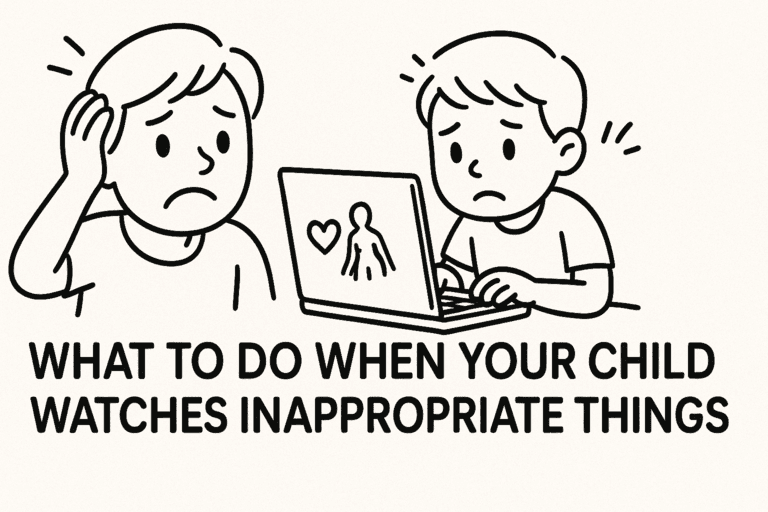If you’ve ever searched “why is my child searching up inappropriate things” or found yourself panicking because your 11-year-old is looking at inappropriate things, you’re not alone.
Every week, posts like these appear on parenting forums and Reddit:
“My 8-year-old was hiding under a blanket, watching strange videos on his tablet.”
“I found inappropriate nudes and fetish terms in my son’s search history—and it was a school-issued device.”
These moments are deeply unsettling—but more common than most parents think.

- Table Of Contents
- 1.Why is My Child Searching Up Inappropriate Things
- 2.How to Talk When Your Child Sees Inappropriate Content
- 3.Should I Be Worried If My Child Searched for Inappropriate Nudes?
- 4.Don’t Try to Erase It – Focus on Long-Term Trust
1.Why is My Child Searching Up Inappropriate Things
Early exposure to inappropriate content isn’t necessarily a sign that something is wrong. Often, it’s the result of:
-
Curiosity + Access: Kids hear about something from classmates and try to look it up.
-
Funny keywords gone wrong: “Farting,” “twerking,” or “feet” might sound funny to an 8-year-old but can quickly lead to NSFW content online.
-
Gaps in digital protection: Even with filters, browsers like Silk or YouTube may show suggested content that slips through.
-
Poor understanding of context: A child might not fully grasp why certain videos are “off-limits.” They’re not watching with intent—they’re exploring.
This doesn’t make it okay, but it does help explain the behavior. Recognizing that your child is navigating a complex, adult internet with a child’s brain is the first step toward a better response.
2.How to Talk When Your Child Sees Inappropriate Content
When you’re shocked, it’s easy to react from emotion. But certain responses can cause more harm than good:
-
Shaming or yelling: This might shut your child down and teach them that curiosity equals punishment.
-
Secret surveillance: Installing spyware without telling them can erode trust, especially as they get older.
-
Avoiding the topic entirely: Pretending it didn’t happen leaves a silence that might get filled with misinformation from peers.
-
Overreacting with therapy: If your child saw something a few times, that doesn’t mean they’re “damaged.” Jumping to professional help without context might make them feel broken.
Many Reddit users recalled long-term guilt, secrecy, or shame caused by aggressive parental responses—often more harmful than the initial exposure.
3.Should I Be Worried If My Child Searched for Inappropriate Nudes?
a. Validate curiosity, while drawing clear lines
Let your child know that curiosity is normal—but that doesn’t mean everything online is okay to watch. You might say:
“I understand you were curious. That’s okay. But some videos can confuse or upset you, and it’s not your fault. It’s just not for kids your age.”
b. Ask questions without accusation
Instead of, “Why would you look at that?!” try:
- “Where did you hear about this?”
- “What did you think when you saw it?”
You’re opening a door, not setting a trap.
c. Use tech to protect, not to punish
This is where digital tools come in—not as a wall, but as a set of guide rails.
If you use a parental control app, tell your child. Explain that it’s about helping them stay safe, not about catching them in the act.
VigilKids, for example, is designed to support parents in a transparent, supportive way:
- Search & Content Monitoring — Gently track what your child is searching and the type of content they’re exposed to.
- Screen Time Balance — Set healthy limits on device use without cutting them off entirely.
- Smart Safety Alerts — Get keyword alerts if risky terms appear, so you can step in early with a conversation.
- Live Insights — Use features like remote screen view to understand what’s happening in real time—without being intrusive.
- Transparent Use — Show your child how VigilKids works and why it’s there, so they feel guided, not spied on.
d. Teach future strategies
Kids need scripts. What to do when:
- A friend tries to show them explicit content
- They’re curious again, and you’re not around
- They stumble onto something by accident
Rehearse simple reactions like: “No thanks, that makes me uncomfortable,” or “I’ll ask my mom or dad about that later.”
4.Don’t Try to Erase It – Focus on Long-Term Trust
The biggest mistake is treating this like a fire to be put out once.
Instead, it’s a starting point—a chance to build a relationship where your child knows they can come to you again.
Keep the door open:
- Revisit the topic gently over time
- Praise honesty
- Watch for behavioral signs, but don’t assume the worst
Your goal isn’t just to “stop the behavior”—it’s to shape how your child thinks about safety, respect, and digital boundaries as they grow.
Conclusion – You’re Not Alone, and You’re Doing Fine
If you’ve caught your child watching something inappropriate, you’re not a failure. You’re a parent in the 2020s.
The fact that you’re reading this, thinking it through, and considering your child’s emotional wellbeing means you’re already doing better than you think.
Mistakes will happen. But trust, transparency, and thoughtful tools like VigilKids can help you handle them with calm—and build something stronger in the process.
